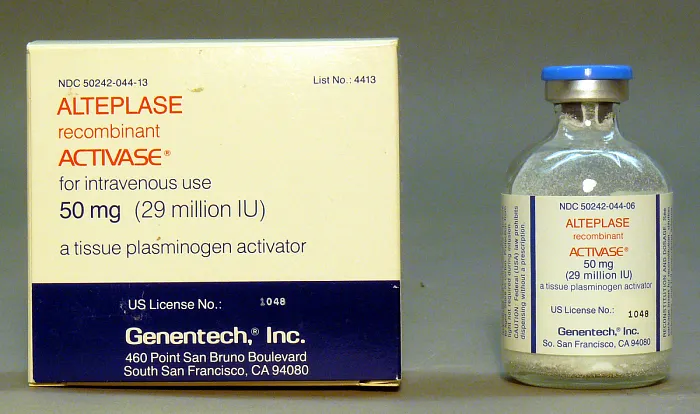Comprehensive Guide to Alteplase: Uses, Dosage, Side Effects, and More
What is Alteplase?
Overview of Alteplase
Generic Name: Alteplase
Brand Name: Activase (USA), Actilyse (Europe)
Drug Group: Thrombolytic agent; tissue plasminogen activator (tPA)
The medication is used to:
- Treat acute ischemic stroke within 3–4.5 hours of symptom onset.
- Manage acute myocardial infarction (AMI) to restore coronary blood flow.
- Treat acute massive pulmonary embolism with hemodynamic instability.
- Clear occluded central venous catheters (off-label or specific protocols).
Key Characteristics
Form: Intravenous (IV) powder for reconstitution (50 mg, 100 mg vials); catheter-directed for specific uses.

Mechanism: Binds to fibrin in clots, activating plasminogen to plasmin, which degrades fibrin.
Approval: FDA-approved (1987 for Activase) and EMA-approved for stroke, myocardial infarction, and pulmonary embolism.
Indications and Uses of Alteplase
Alteplase is indicated for:
Acute Ischemic Stroke: Restores cerebral blood flow in adults within 3–4.5 hours of symptom onset, if imaging confirms no hemorrhage.
Acute Myocardial Infarction (AMI): Dissolves coronary artery clots to restore blood flow in adults with ST-elevation myocardial infarction (STEMI).
Acute Pulmonary Embolism (PE): Treats massive PE causing hemodynamic instability.
Off-Label Uses: Clears occluded central venous catheters or treats peripheral arterial thrombosis under specialist guidance.
Dosage of Alteplase
Dosage for Adults
Acute Ischemic Stroke:
- Dose: 0.9 mg/kg IV (maximum 90 mg) over 60 minutes.
- Administration: 10% as bolus over 1 minute, remainder infused over 59 minutes.
Acute Myocardial Infarction:
- Accelerated Infusion (≤67 kg): 15 mg bolus, then 0.75 mg/kg over 30 minutes (max 50 mg), then 0.5 mg/kg over 60 minutes (max 35 mg).
- Accelerated Infusion (>67 kg): 15 mg bolus, then 50 mg over 30 minutes, then 35 mg over 60 minutes (total ≤100 mg).
- 3-Hour Infusion: 60 mg over 1st hour (6–10 mg bolus), 20 mg over 2nd hour, 20 mg over 3rd hour (total ≤100 mg).
Pulmonary Embolism: Dose: 100 mg IV over 2 hours, followed by heparin.
Catheter Clearance (Off-Label): 1–2 mg instilled into catheter; dwell time 30–120 minutes.
Dosage for Children
Not approved for pediatric use; limited data for off-label use in specific cases (e.g., catheter thrombosis).
Dosage for Pregnant Women
Dosage Adjustments
Renal/Hepatic Impairment: No specific adjustments; monitor for bleeding.
Elderly: Increased bleeding risk; use cautiously with strict eligibility criteria.
Additional Considerations
- Administer in a hospital with immediate access to imaging and emergency care.
- Avoid invasive procedures (e.g., arterial punctures) during and shortly after infusion.
How to Use Alteplase
Administration:
- IV Infusion: Reconstitute powder with sterile water; administer via infusion pump in a hospital setting.
- Catheter-Directed: Instill into occluded catheter per protocol; avoid systemic infusion unless indicated.
Timing: Administer within time windows (e.g., 3–4.5 hours for stroke, as soon as possible for AMI/PE).
Monitoring: Check for bleeding, neurological status (for stroke), or cardiac rhythm (for AMI) during and after infusion.
Additional Tips:
- Do not mix with other medications in the same IV line.
- Report signs of bleeding (e.g., blood in urine, gums) or neurological changes immediately.
Contraindications for Alteplase
The thrombolytic is contraindicated in:
Absolute (Stroke):
- Active internal bleeding or recent (within 3 months) intracranial hemorrhage.
- Intracranial neoplasm, arteriovenous malformation, or aneurysm.
- Recent (within 3 months) ischemic stroke, head trauma, or brain surgery.
- Uncontrolled hypertension (>185/110 mmHg) at presentation.
Absolute (AMI/PE):
- Active bleeding (excluding menses).
- Prior intracranial hemorrhage or known bleeding diathesis.
- Recent major surgery (within 3 weeks) or trauma.
Relative: Recent gastrointestinal bleeding, prolonged CPR, or severe liver disease.
Warnings & Precautions for Alteplase
General Warnings
Bleeding Risk: High risk of intracranial or systemic hemorrhage; monitor for bleeding signs (e.g., hematuria, hematemesis).
Neurological Complications: Risk of cerebral edema or hemorrhage in stroke patients; monitor neurological status closely.
Arrhythmias (AMI): Reperfusion may cause arrhythmias; monitor cardiac rhythm.
Cholesterol Embolization: Rare; may cause organ damage post-thrombolysis.
Hypersensitivity: Rare anaphylaxis or angioedema; discontinue if occurs.
Use in Specific Populations
Pregnancy: Category C; use cautiously due to bleeding risk to mother and fetus.
Breastfeeding: Unknown if excreted in breast milk; weigh benefits versus risks.
Elderly: Higher bleeding risk, especially intracranial; assess risk-benefit carefully.
Children: Not approved; limited data for off-label use.
Renal/Hepatic Impairment: Increased bleeding risk; monitor closely.
Additional Precautions
- Confirm eligibility (e.g., CT scan for stroke) before administration.
- Avoid anticoagulants or antiplatelets during the first 24 hours post-infusion unless essential.
Overdose and Management of Alteplase
Overdose may cause:
- Severe bleeding (intracranial, gastrointestinal, or retroperitoneal).
- Hypotension or shock from blood loss.
- Neurological deterioration (in stroke patients).
Immediate Actions
Contact Emergency Services: Stop infusion; seek immediate medical intervention.
Supportive Care: Administer blood transfusions, cryoprecipitate, or fresh frozen plasma for bleeding; consider antifibrinolytics (e.g., tranexamic acid).
Monitor: Check hemoglobin, coagulation parameters, and neurological/cardiac status.
Additional Notes
- Overdose is rare with weight-based dosing; ensure accurate calculations.
- Administer only by trained professionals in a controlled setting.
Side Effects of Alteplase
Common Side Effects
- Minor bleeding (10–15%; e.g., at injection sites, gums).
- Nausea (5–10%).
- Fever (2–5%).
- Hypotension (1–3%).
These effects are often transient but require monitoring.
Serious Side Effects
Hemorrhagic: Intracranial bleeding (0.5–1%), gastrointestinal bleeding, or hematuria.
Neurologic: Worsening stroke symptoms or seizures (stroke patients).
Cardiovascular: Arrhythmias or reperfusion injury (AMI patients).
Allergic Reactions: Rare; rash, angioedema, or anaphylaxis.
Additional Notes
- Bleeding is the most significant risk; monitor closely during and after infusion.
- Report any unusual symptoms immediately.
Drug Interactions with Alteplase
The medication may interact with:
Anticoagulants (e.g., Heparin, Warfarin): Increase bleeding risk; avoid or delay post-infusion.
Antiplatelets (e.g., Aspirin, Clopidogrel): Increase bleeding risk; use cautiously in AMI or stroke.
NSAIDs: May enhance bleeding risk; avoid during treatment.
Other Thrombolytics: Contraindicated; risk of excessive fibrinolysis.
Patient Education or Lifestyle
Medication Adherence: Alteplase is administered by professionals; follow post-treatment instructions (e.g., avoiding invasive procedures).
Monitoring: Report bleeding (e.g., blood in urine, black stools), neurological changes, or chest pain immediately.
Lifestyle: After treatment, adopt a heart-healthy diet, exercise regularly, and avoid smoking to reduce cardiovascular risk.
Emergency Awareness: Know signs of bleeding or stroke recurrence; seek immediate care for symptoms like severe headache or weakness.
Follow-Up: Attend all follow-up appointments for imaging, lab tests, or cardiac/stroke rehabilitation.
Medication Awareness: Inform all healthcare providers about recent Alteplase use before procedures or new medications.
Pharmacokinetics of Alteplase
Absorption: Immediate bioavailability via IV administration.
Distribution: Volume of distribution ~8–10 L; primarily intravascular.
Metabolism: Hepatic clearance; rapidly inactivated by plasminogen activator inhibitor-1.
Excretion: Cleared via liver; minimal renal excretion.
Half-Life: 4–5 minutes (initial); 26–40 minutes (terminal).
Pharmacodynamics of Alteplase
The thrombolytic exerts its effects by:
Binding to fibrin in clots, converting plasminogen to plasmin.
Degrading fibrin, dissolving clots within minutes to hours.
Restoring blood flow in occluded arteries (cerebral, coronary, or pulmonary).
Demonstrating rapid onset but short duration due to rapid clearance.
Storage of Alteplase
Temperature: Store unreconstituted vials at room temperature (2–30°C or 36–86°F); protect from excessive heat.
Reconstituted Solution: Use within 8 hours if stored at 2–30°C; do not freeze.
Protection: Keep in original packaging to protect from light.
Safety: Store out of reach of children; restricted to hospital use.
Frequently Asked Questions (FAQs)
Q: What does Alteplase treat?
A: The drug treats acute ischemic stroke, heart attack, and pulmonary embolism.
Q: Can Alteplase cause bleeding?
A: Yes, bleeding is a major risk; report blood in urine or severe headache immediately.
Q: Is Alteplase safe for children?
A: Not approved for pediatric use; limited data for off-label use.
Q: How quickly does Alteplase work?
A: Clot dissolution begins within minutes, with effects in hours if successful.
Q: Who administers Alteplase?
A: Only trained healthcare professionals in a hospital setting.
Regulatory Information
The medication is approved by:
U.S. Food and Drug Administration (FDA): Approved in 1987 (Activase) for stroke, myocardial infarction, and pulmonary embolism.
European Medicines Agency (EMA): Approved as Actilyse for similar indications.
Other Agencies: Approved globally for equivalent uses; consult local guidelines.
References
- U.S. Food and Drug Administration (FDA). (2023). Activase (Alteplase) Prescribing Information.
- Official FDA documentation detailing the drug’s approved uses, dosage, and safety.
- European Medicines Agency (EMA). (2023). Actilyse Summary of Product Characteristics.
- EMA’s comprehensive information on the medication’s indications and precautions in Europe.
- National Institutes of Health (NIH). (2023). Alteplase: MedlinePlus Drug Information.
- NIH resource providing detailed information on the drug’s uses, side effects, and precautions.
- World Health Organization (WHO). (2023). WHO Model List of Essential Medicines: Alteplase.
- WHO’s inclusion of Alteplase for acute stroke and myocardial infarction.
- New England Journal of Medicine. (2019). Thrombolytic Therapy in Acute Ischemic Stroke.
- Peer-reviewed article on Alteplase efficacy (note: access may require a subscription).
